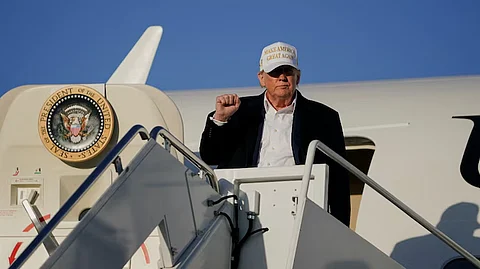

As trade tensions escalate between Washington and New Delhi, a much-anticipated visit by US President Donald Trump to India this autumn is now clouded by uncertainty.
The growing rift is not only straining bilateral ties between the world’s oldest and largest democracies but also raising doubts over the future of the Quad — a key Indo-Pacific alliance seen as a bulwark against China’s growing regional dominance.
According to a source familiar with summit preparations, the White House has been pressing India for substantial “deliverables” that Trump, known for his “America First” agenda, can announce during the proposed visit. The trip is tentatively scheduled to coincide with the Quad leaders’ summit in September or October.
Both countries had initially aimed to finalise a comprehensive trade agreement in time for the visit to give it strategic and political weight. But without a trade breakthrough, the source said, it is becoming increasingly unlikely that Trump will travel to India.
The Quad — comprising the US, India, Japan, and Australia — was formed in 2004 but remained largely inactive until it was revived during Trump’s first term in 2017. His successor, President Joe Biden, elevated the bloc to leaders’ level in 2021 as a central pillar of the US Indo-Pacific strategy.
However, Trump has recently threatened to impose a 25 percent tariff on Indian goods from August 1, while also suggesting an additional “penalty” for India’s continued oil imports from Russia — a move that has reportedly left New Delhi “bitter,” according to another person familiar with India’s stance.
From April to July, the two sides held five rounds of trade talks, with India seeking “preferential” treatment on the grounds of its strategic importance as a key US ally in the Indo-Pacific. However, Trump has insisted on full market access and has shown little inclination to acknowledge India’s role in countering Beijing, proceeding instead with steep tariffs on Indian imports.
Analysts warn that a breakdown in US-India trade negotiations — coupled with the possible cancellation of Trump’s visit — could hand China a significant strategic advantage in the region.
Lisa Curtis, who served as deputy assistant to the president and senior director for South and Central Asia during Trump’s first term, criticised the president’s narrow focus on tariffs and trade. “Trump is ignoring the bigger geopolitical picture and the larger challenges to US national security,” she said.
Curtis, now director of the Indo-Pacific Security Programme at the Centre for a New American Security, added: “The security imperative to counter growing Chinese military power and influence requires the US to draw countries like India into a closer embrace — not pick fights to gain better market access.”
She warned that if trade talks collapse and Trump cancels his visit, it would amount to “a clear win for China.”
The Quad has been a key platform for coordinating Indo-Pacific strategies. Curtis cautioned that the second Trump administration’s “lack of strategic perspective on US-India ties threatens to undermine” the trust and confidence built during his first term.
Wendy Cutler, a former US diplomat and trade negotiator, echoed those concerns, saying that the current trade tensions “call into question the timing of a Quad leaders’ meeting” and complicate preparations. “The prospect of announcing the successful conclusion of a bilateral trade agreement undoubtedly made a presidential visit more compelling than just attending a Quad meeting,” said Cutler, now vice-president of the Asia Society Policy Institute.
She noted that India and other trading partners were aware of Trump’s fixation on trade and tariffs but hoped that “over time, issues of strategic cooperation will move to the forefront.”
Christopher Clary, a political science professor at the University at Albany, said the Quad is “less important now for Washington than it was during the Biden administration or Trump’s first term.” However, he emphasised that if the Quad members do not align their strategies, “China will have greater room to enhance its global and regional influence.”
Despite the current tensions, Curtis said a trade agreement before the Quad summit in autumn remains possible, though prospects are “somewhat bleak.” Trump’s repeated criticisms, she warned, are “backing Prime Minister Narendra Modi into a corner,” making it politically difficult for him to appear as making concessions.
Manjari Chatterjee Miller, a senior fellow at the Council on Foreign Relations, described the moment as “incredibly destabilising” for US-India ties. “Unless Modi and Trump can reach an agreement, recovery will be difficult,” she said.
“The last thing India wants is for a strong Russia-China relationship to develop at its expense,” Miller added. “US administrations over the past decade have typically overlooked the Russia factor to build a strong relationship with India. But China could benefit from a tense US-India relationship.”